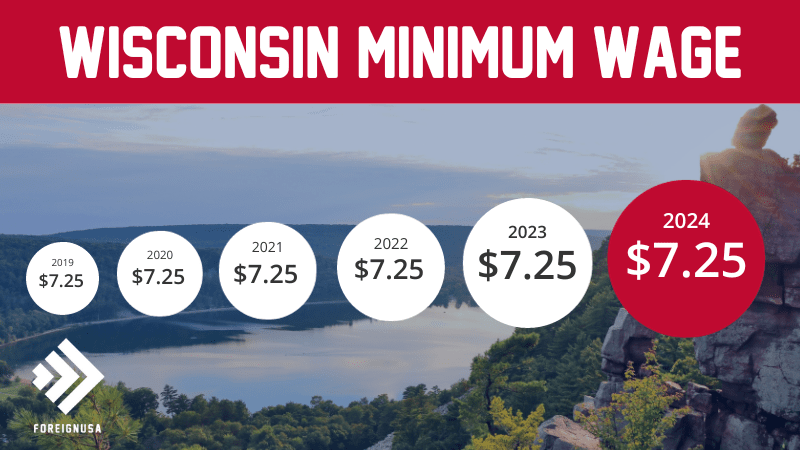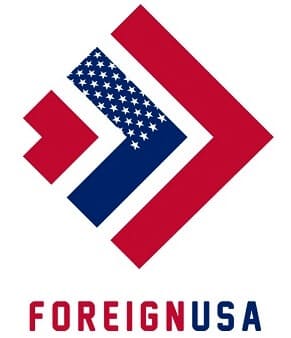When you are doing business in the U.S., whether as a business or franchise owner, or if you are an employee working in Wisconsin, it is essential to understand and know the law and, subsequently, your rights when it comes to paying employees or being the recipient of the minimum wage as an employee.
Let’s look at the Wisconsin state minimum wage.
The Wisconsin state minimum wage has not increased for over a decade. Wisconsin, along with many other states still use the federal minimum wage of $7.25.
There is no sign of an increase in the federal minimum wage anytime soon, however, there could be for the state of Wisconsin.
It is not unusual for a state to not have its own higher minimum wage 21 other states use the federal wage as their minimum wage.
Did the Wisconsin Minimum Wage Go Up?
The graphic below highlights the Wisconsin minimum wage over the past several years. The minimum wage did not go up and remains at $7.25 per hour in 2024.

If you are a full-time worker on minimum wage in Wisconsin, your earnings could be as follows:
- Daily Minimum Wage: $58.00 (based on an 8-hour working day).
- Weekly Minimum Wage: $290.00 (based on a 40-hour week).
- Yearly Minimum Wage: $15,080.00 (based on being paid 52 weeks per year).
The Wisconsin minimum wage 2024 hasn’t increased from the previous year, in fact, it hasn’t increased since 2009! Most employers will have to abide by the minimum wage set for their state for all employees they plan to pay minimum wage to.
The law is simply that the minimum wage is the lowest hourly, daily, or monthly wage that businesses may legally pay to employees or workers.
So far there have been no talks of a Wisconsin minimum wage increase in 2024 or in future years for it to surpass the federal minimum wage of $7.25 per hour, and there have been no talks of a federal minimum wage increase either.
Should you have any concerns, or questions, or need clarity on the Wisconsin minimum wage 2024 as an employer or employee, feel free to visit the Wisconsin Department of Workforce Development website and make an inquiry or file an unemployment claim.
You can view and download the official Wisconsin state minimum wage labor law poster for 2024 here at no charge. Employers must display a poster outlining the requirements of the Fair Labor Standards Act (FLSA), ensuring that accurate employee time and pay records are kept.
Wisconsin Minimum Wage History
The table below shows the current rate and history of Wisconsin’s minimum wage over the past 40+ years since 1983. You can see when there were increases in the minimum wage, how much they were, and what percentage increase it represents each year.
| Year | Minimum Wage | Increase ($) | Increase (%) |
|---|---|---|---|
| 2024 | $7.25 | $0 | 0% |
| 2023 | $7.25 | $0 | 0% |
| 2022 | $7.25 | $0 | 0% |
| 2021 | $7.25 | $0 | 0% |
| 2020 | $7.25 | $0 | 0% |
| 2019 | $7.25 | $0 | 0% |
| 2018 | $7.25 | $0 | 0% |
| 2017 | $7.25 | $0 | 0% |
| 2016 | $7.25 | $0 | 0% |
| 2015 | $7.25 | $0 | 0% |
| 2014 | $7.25 | $0 | 0% |
| 2013 | $7.25 | $0 | 0% |
| 2012 | $7.25 | $0 | 0% |
| 2011 | $7.25 | $0 | 0% |
| 2010 | $7.25 | $0 | 0% |
| 2009 | $7.25 | $0.75 | 11.5% |
| 2008 | $6.50 | $0 | 0% |
| 2007 | $6.50 | $0.80 | 14.03% |
| 2006 | $5.70 | $0 | 0% |
| 2005 | $5.70 | $0.55 | 10.67% |
| 2004 | $5.15 | $0 | 0% |
| 2003 | $5.15 | $0 | 0% |
| 2002 | $5.15 | $0 | 0% |
| 2001 | $5.15 | $0 | 0% |
| 2000 | $5.15 | $0 | 0% |
| 1999 | $5.15 | $0 | 0% |
| 1998 | $5.15 | $0 | 0% |
| 1997 | $5.15 | $0.40 | 8.42% |
| 1996 | $4.75 | $0.50 | 11.76% |
| 1995 | $4.25 | $0 | 0% |
| 1994 | $4.25 | $0 | 0% |
| 1993 | $4.25 | $0 | 0% |
| 1992 | $4.25 | $0.45 | 11.84% |
| 1991 | $3.80 | $0 | 0% |
| 1990 | $3.80 | $0.15 | 4.1% |
| 1989 | $3.65 | $0.30 | 8.95% |
| 1988 | $3.35 | $0 | 0% |
| 1987 | $3.35 | $0.10 | 3.07% |
| 1986 | $3.25 | $0 | 0% |
| 1985 | $3.25 | $0 | 0% |
| 1984 | $3.25 | $0 | 0% |
| 1983 | $3.25 | $0 | 0% |
Wisconsin Minimum Wage Exemptions
In addition to the regular minimum wage rate, there are a few Wisconsin state minimum wage exemptions that typically depend on your age or employment situation. Below are the various minimum wage exemptions with some situational examples.
Wisconsin Student Minimum Wage
The minimum wage for student employees in Wisconsin is 85% of the Wisconsin minimum wage, making their hourly pay $6.16 per hour in 2024.
This hourly rate is for any hours worked up to 20 hours per week. As a student employee, once you surpass 20 hours per week, you will be eligible to be paid the Wisconsin minimum wage rate of $7.25 per hour.
Being a student can be financially challenging, leading many students to pick up part-time jobs to make extra money while studying. Despite a student minimum wage rate, many Wisconsin employers will not necessarily follow it and pay you equal to or more than the statewide minimum wage.
Many work-study programs are available at universities, which is a route many students go down. Still, coffee shop, cafe, bar, and restaurant jobs are commonly taken by students as they can work them into their class schedule.
Wisconsin Under 20 Minimum Wage
If you are under 20 years old in Wisconsin, federal law allows your employer to pay you as little as $4.25 per hour for your first 90 days of employment.
Once the 90-day period is over, you will be eligible to be paid the 2024 Wisconsin minimum wage of $7.25 per hour or potentially even more.
Fortunately for young workers, this is 90 calendar days and not 90 working days; therefore, it can be completed relatively quickly and within about three months.
Wisconsin Tipped Minimum Wage
If you are a tipped employee in Wisconsin (someone who receives regular tips as a part of their job) then you are eligible to be paid a minimum wage of $2.33 per hour, with a tip credit of $4.92 per hour, ensuring that you reach the statewide minimum wage regardless if you make enough hourly tips.
Wisconsin Overtime Minimum Wage
Once you work over 40 hours a week, you are eligible to be paid an overtime rate of 1.5 times your hourly wage for every hour you work past 40. So, the overtime minimum wage in Wisconsin is $10.88 per hour, 1.5 times the minimum wage of $7.25 per hour.


